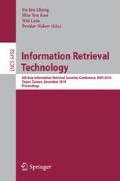Abstract
The aim of this work is to produce fast, easy-to-apply but effective algorithms for clustering large text collections. In this paper, we propose a novel concept of similarity measure among objects and its related clustering algorithms. The similarity between two objects within a cluster is measured from the view of all other objects outside that cluster. As a result, two optimality criteria are formulated as the objective functions for the clustering problem. We analyze and compare the proposed clustering approaches with the popular algorithms for document clustering in the literature. Extensive empirical experiments are carried out on various benchmark datasets and evaluated by different metrics. The results show that our proposed criterion functions consistently outperform the other well-known clustering criteria, and give the best overall performance with the same computational efficiency.
Access this chapter
Tax calculation will be finalised at checkout
Purchases are for personal use only
Preview
Unable to display preview. Download preview PDF.
References
Banerjee, A., Dhillon, I., Ghosh, J., Sra, S.: Clustering on the unit hypersphere using von Mises-Fisher distributions. J. Mach. Learn. Res. 6, 1345–1382 (2005)
Banerjee, A., Merugu, S., Dhillon, I., Ghosh, J.: Clustering with Bregman divergences. J. Mach. Learn. Res. 6, 1705–1749 (2005)
Dhillon, I.S.: Co-clustering documents and words using bipartite spectral graph partitioning. In: KDD, pp. 269–274 (2001)
Dhillon, I., Modha, D.: Concept decompositions for large sparse text data using clustering. Mach. Learn. 42(1-2), 143–175 (2001)
Ding, C., He, X., Zha, H., Gu, M., Simon, H.: A min-max cut algorithm for graph partitioning and data clustering. In: IEEE ICDM, pp. 107–114 (2001)
Duda, R.O., Hart, P.E., Stork, D.G.: Pattern Classification, 2nd edn. John Wiley & Sons, New York (2001)
Friedman, J., Meulman, J.: Clustering objects on subsets of attributes. J. R. Stat. Soc. Series B Stat. Methodol. 66(4), 815–839 (2004)
Gu, Q., Zhou, J.: Co-clustering on manifolds. In: KDD, pp. 359–368 (2009)
Guyon, I., von Luxburg, U., Williamson, R.C.: Clustering: Science or Art? In: NIPS 2009 Workshop on Clustering Theory (December 2009), http://clusteringtheory.org/
Karypis, G.: CLUTO a clustering toolkit. Tech. rep., Dept. of Computer Science, Uni. of Minnesota (2003), http://glaros.dtc.umn.edu/gkhome/views/cluto
Mitchell, T.M.: Machine Learning. McGraw-Hill, New York (1997)
Pekalska, E., Harol, A., Duin, R.P.W., Spillmann, B., Bunke, H.: Non-Euclidean or non-metric measures can be informative. In: Yeung, D.-Y., Kwok, J.T., Fred, A., Roli, F., de Ridder, D. (eds.) SSPR 2006 and SPR 2006. LNCS, vol. 4109, pp. 871–880. Springer, Heidelberg (2006)
Pelillo, M.: What is a cluster? Perspectives from game theory. In: NIPS 2009 Workshop on Clustering Theory (December 2009), http://clusteringtheory.org/
Wang, J., Xia, Y., Zheng, T.F., Wu, X.: Job information retrieval based on document similarity. In: Li, H., Liu, T., Ma, W.-Y., Sakai, T., Wong, K.-F., Zhou, G. (eds.) AIRS 2008. LNCS, vol. 4993, pp. 165–175. Springer, Heidelberg (2008)
Wu, X., Kumar, V., Ross Quinlan, J., Ghosh, J., Yang, Q., Motoda, H., McLachlan, G.J., Ng, A., Liu, B., Yu, P.S., Zhou, Z.H., Steinbach, M., Hand, D.J., Steinberg, D.: Top 10 algorithms in data mining. Knowl. Inf. Syst. 14(1), 1–37 (2007)
Xu, W., Liu, X., Gong, Y.: Document clustering based on non-negative matrix factorization. In: SIGIR, pp. 267–273 (2003)
Zhao, Y., Karypis, G.: Empirical and theoretical comparisons of selected criterion functions for document clustering. Mach. Learn. 55(3), 311–331 (2004)
Zhao, Y., Karypis, G.: Hierarchical clustering algorithms for document datasets. Data Min. Knowl. Discov. 10(2), 141–168 (2005)
Zhong, S., Ghosh, J.: A unified framework for model-based clustering. J. Mach. Learn. Res. 4(6), 1001–1037 (2004)
Author information
Authors and Affiliations
Editor information
Editors and Affiliations
Rights and permissions
Copyright information
© 2010 Springer-Verlag Berlin Heidelberg
About this paper
Cite this paper
Nguyen, D.T., Chen, L., Chan, C.K. (2010). Multi-viewpoint Based Similarity Measure and Optimality Criteria for Document Clustering. In: Cheng, PJ., Kan, MY., Lam, W., Nakov, P. (eds) Information Retrieval Technology. AIRS 2010. Lecture Notes in Computer Science, vol 6458. Springer, Berlin, Heidelberg. https://doi.org/10.1007/978-3-642-17187-1_5
Download citation
DOI: https://doi.org/10.1007/978-3-642-17187-1_5
Publisher Name: Springer, Berlin, Heidelberg
Print ISBN: 978-3-642-17186-4
Online ISBN: 978-3-642-17187-1
eBook Packages: Computer ScienceComputer Science (R0)

